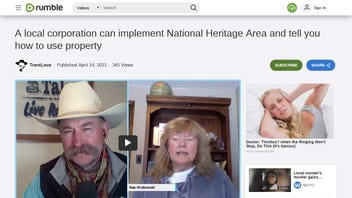
Do private landowners lose control of their property when tourism promoters and/or history buffs get a region of their state designated a National Heritage Area? No, that's not true: There is no evidence National Heritage Areas empower federal or local authorities to take control of lands inside the map lines drawn to highlight areas of historic or cultural interest. The honorary designation funnels federal matching funds to local groups to increase interest in things like the Motor Cities in the Detroit area, Erie Canalway in New York state or West Virginia's National Coal areas in the East; or North Dakota's Great Plains and Washington's saltwater shorelines in the West. A report by the nonpartisan General Accounting Office (GAO) found that heritage areas did not appear to have affected property owners' rights. The federal law establishing six new heritage areas in 2019 specifically protected private property.
The claim that National Heritage Areas designation is a land-grab has been widely spread through social media, including an April 14, 2021, Trent Loos/Rae Grulkowski video (archived here) on the LoosTales Rumble account under the title "A local corporation can implement National Heritage Area and tell you how to use property". It opened:
Loos Tales Special Report April 14, 2021 Rae Grulkowski from Great Falls, MT accidentally attended a meeting nearly 2 years ago and learned the dangers of NHA.
Social media users saw this:
In the video, Loos and Grulkowski repeat the claim from the caption about the honorary designation being used to seize control of private lands. They theorize National Heritage Areas are part of what they allege is a land grab at the heart of the "30x30" goal adopted by President Joe Biden. The 30 Percent By 2030 plan calls for preservation of 30% of the planet's open lands to slow climate change. About 12%-14% of the U.S. is under some form of conservation-oriented protection. For context, military acreage makes up about 27% of the U.S. land base. Farm state residents have begun to buck the 30x30 proposal, calling it a land grab, while advocates say voluntary conservation easements and similar programs would pay farmers to keep farming.
The local nonprofit organization promoting the Big Sky Country National Heritage Area has written in its public documents that the goal is to "promote economic development and tourism within the Upper Missouri River area," focusing on attractions such as C.M. Russell Museum and Studio National Historic Landmark, Fort Benton National Historic Landmark, the Lewis and Clark Great Falls Portage National Historic Landmark, and the First People's Buffalo Jump National Historic Landmark.
Congress has to approve National Heritage Area designation if the local group is to receive federal matching funds. The National Park Service provides technical assistance to the local group and distributes federal funds.
On a Q&A page on land use, The National Park Service spells out the history and law regarding National Heritage Areas (NHAs):
- NHA designation does not affect private property owners or restrict their property rights, nor does it require that they maintain their property to particular specifications.
- NHA designation does not confer to the local coordinating entity any powers of eminent domain. There is no real, implied, or intended additional restrictions on local land use regulation generated by NHA designation.
- Inclusion of private property within the boundary of a NHA does not change or prohibit any actions or use which may otherwise be taken by the property owner with respect to the private property according to federal law or regulations.
- Private property owners are not required to allow public access to their lands because of National Heritage Area designation. Designation of a National Heritage Area does not establish public right-of way or change land ownership or authority over private property.
- The creation of a new NHA does not come with new federal historic preservation requirements; zoning or other land use regulation overlays; or renovation, redevelopment, or demolition rules.
- NHAs are not intended to be federally-owned entities. Many of the laws which created individual NHAs did not give any federal government agency the authority to acquire property. In other cases, laws creating NHAs state that the NHA local coordinating entity cannot use federal funding to acquire real property.
- Congress did authorize federal acquisition of land in two National Heritage Areas when they created National Park units in the same areas. Cane River Creole National Historical Park and the Cane River NHA were authorized in the same law in 1994. Congress established the Blackstone River Valley National Historical Park in 2014 within the existing John H. Chafee Blackstone River Valley National Heritage Corridor, designated in 1986. In both cases lands were acquired from willing sellers.
A 2004 report by the government-auditing GAO found that "heritage areas do not appear to have affected property owners' rights. In fact, the designating legislation of 13 areas and the management plans of at least 6 provide assurances that such rights will be protected."
In 2019, when Congress granted NHA designation to six new areas, the legislation, PL116-9, declared that the new NHAs would not reduce the rights of any property owner; require any property owner to permit public access to the property; alter any land use regulation; or diminish the authority of the state to manage fish and wildlife, including the regulation of fishing and hunting within the NHA.
The bipartisan EveryCRSReport.com research service offers a Congressional Research Service study that describes the program as follows:
...NHAs typically are non-federally owned, managed by local people with many partners and NPS advice, funded from many sources, and intended to promote local economic development as well as to protect natural and cultural heritage resources and values. The NPS provides technical and financial aid to NHAs, but these areas are not part of the National Park System. Heritage areas consist mainly of private properties, although some include publicly owned lands. In most cases, the laws establishing NHAs do not provide for federal acquisition of land; once designated, heritage areas generally remain in private, state, or local government ownership or a combination thereof.















